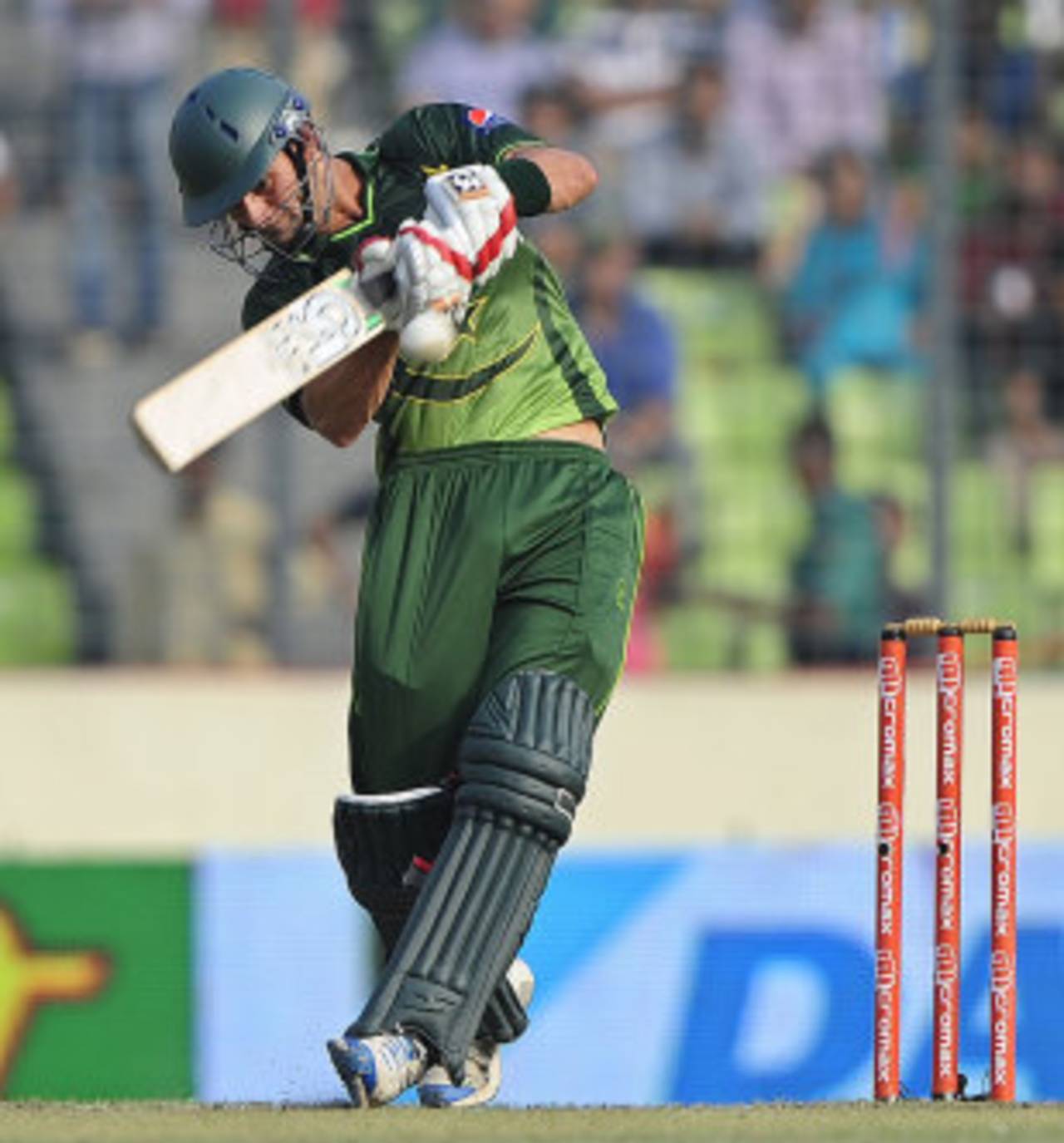No victory too small
The Asia Cup hasn't always been memorable but this year's edition is finding it hard to go away. Pakistan won the cup, Bangladesh won hearts, and Sachin Tendulkar won back his poise thanks to a landmark hundred
Kamran Abbasi
Feb 25, 2013, 11:28 PM

Hammad Azam looks a bright prospect for Pakistan • AFP
The Asia Cup hasn't always been memorable but this year's edition is finding it hard to go away. Pakistan won the cup, Bangladesh won hearts, and Sachin Tendulkar won back his poise thanks to a landmark hundred.
Three nations coming away with something to cheer about is an ingenious outcome for a tournament with four competitors, although Bangladesh spoilt the win-win atmosphere with their attempt to overturn the result of the final. Did Aizaz Cheema deliberately block Mahmudullah in the last over? Possibly, but a cricket board should refrain from appealing an umpiring decision after a match has finished.
Indeed, Bangladesh's plea is symptomatic of a frazzled relationship with the Pakistan Cricket Board, whose earlier assumption that Bangladesh would be the first to tour since 2009 was premature. The Bangladesh board has a duty to look after the safety of its players but, that said, it also has a duty not to mess with the psyche of fans. To offer a lifeline to Pakistan and then pull it away by suddenly changing the criteria for the trip is amateurish and seems disingenuous. Restoring home fixtures to Pakistan is a major step, and one that requires clear decision-making, not whimsical posturing from either side.
Pakistan's reality is that the cricket board remains politically isolated, a sentiment that will be reinforced when the Indian Premier League takes centre stage again. Instead of fretting over a tournament of questionable benefit, except to a player's luxury items fund, Pakistan should focus on firming up their international programme at neutral venues and creating a thriving domestic game.
The last 18 months have proved that Pakistan has the talent pool to remain competitive, and possibly excel; take shelter from the storm until fair winds usher international teams to Karachi, Lahore, and Peshawar.
Pakistan aren't yet entirely convincing on the field, notably in limited-overs cricket, but winning the Asia Cup with room for personal development is an optimistic sign -- and a welcome recovery from the dismal performances against England in the United Arab Emirates.
Questions about Misbah-ul-Haq's cautious approach are unlikely to disappear, although he now has a more aggressive coach, in Dav Whatmore, to push him into more adventurous territory.
Whatmore was unlucky to miss out on the coaching job when Geoff Lawson succeeded Bob Woolmer in 2007. He has a weaker team to develop than he would have acquired last time but Whatmore's business is polishing rough diamonds. Indeed, after Woolmer, Whatmore is the most accomplished coach ever hired by Pakistan.
Whatmore will already have identified the weaknesses in his team. He won't waste time. He will want his team to play tough and hard. Luckily, the Asia Cup proved more helpful than simply a successful first tournament with Pakistan.
Nasir Jamshed, Hammad Azam, and Sarfraz Ahmed each made claims to problem positions in the Pakistan line up. Of the three, Hammad looks the brightest prospect. Sarfraz is the best of the one-day keepers, and a more capable batsman than Adnan Akmal. Nasir may find it hardest to convince, but he took his chance in Bangladesh.
No victory is small for Pakistan cricket in its current state, and the Bangladesh fans gave the Asia Cup an importance it has rarely enjoyed -- enough importance to suggest that with the emergence of a genuine fourth contender, the Asia Cup has more of a future than was previously imagined.
Kamran Abbasi is an editor, writer and broadcaster. He tweets here